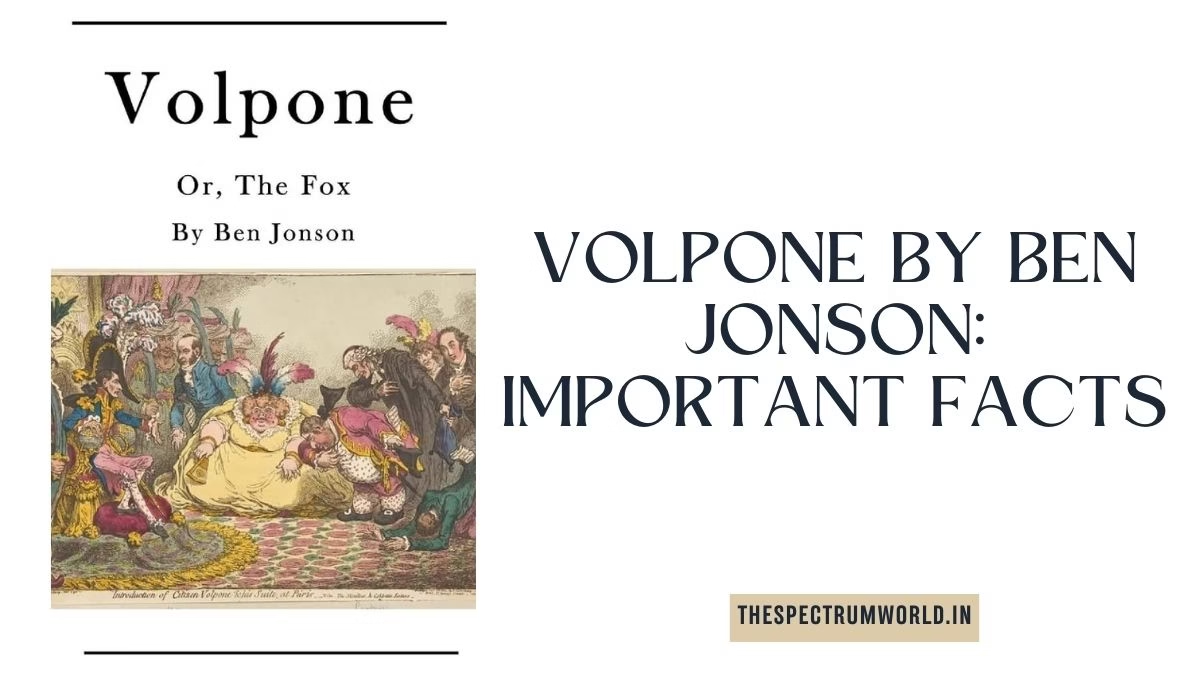Volpone By Ben Jonson: Important Facts
It is a comedic masterpiece written by Ben Jonson, first performed in 1605-1606. The play is a biting satire that critiques the social ills of Jacobean England, showcasing Jonson’s remarkable wit and insight into human nature.
The story revolves around Volpone, a wealthy Venetian merchant who, feigning illness, tests his greedy acquaintances by pretending to be on his deathbed. He encourages them to bring gifts in hopes of being named his heir. As the play unfolds, the clever servant, Mosca, manipulates the situation, leading to a series of comedic misunderstandings and unexpected twists.
Table of Contents

Main Characters in Volpone:
- Volpone: The wealthy and cunning Venetian merchant who feigns illness to test his acquaintances’ loyalty and greed.
- Mosca: The clever and manipulative servant who becomes entangled in his master’s schemes.
The Legacy Hunters
- Voltore: A lawyer who brings gifts in hopes of being named his heir.
- Corbaccio: An old and miserly nobleman who offers gifts and disinherits his own son.
- Corvino: A merchant who brings gifts and is willing to sacrifice his wife’s honor for his own gain.
Other notable characters
- Celia: Corvino’s wife, who becomes the object of Volpone’s desire.
- Bonario: Corbaccio’s son, who represents virtue and honesty.
- Sir Politic Would-Be: An English knight who is portrayed as foolish and pretentious.

Act-wise Summary of Volpone:
Act 1
The play introduces the central character, a wealthy Venetian merchant who feigns illness to test his acquaintances’ loyalty and greed. His servant Mosca informs him about the gifts brought by the legacy hunters, including Voltore, Corbaccio, and Corvino.
Act 2
The legacy hunters continue to bring gifts, and Mosca manipulates them into believing they are Volpone’s favored heir. Meanwhile, Volpone becomes infatuated with Celia, Corvino’s wife.
Act 3
The protagonist attempts to seduce Celia, but she resists and is saved by Bonario, Corbaccio’s son. Mosca’s manipulations become more complex, and the legacy hunters’ rivalry intensifies.
Act 4
The legacy hunters’ schemes are revealed, and Volpone’s plan begins to unravel. Mosca’s role becomes more central, and tensions rise among the characters.
Act 5
The play reaches its climax as the legacy hunters’ deceit is exposed, and Volpone’s scheme collapses. Justice is served, and the characters receive their due punishments or rewards.

Quotes from Volpone:
- “Good morning to the day; and next, my gold!” – (Act 1, Scene 1)
- “All which I thank thee for; and in requital / Of thy good services, thy skill, thy industry… I will make thee heir / Of all my fortune.” – (Act 1, Scene 1)
- “Thy praise is something saucy.” – (Act 1, Scene 1)
- “Riches, the dumb god, that gives no ‘rrant / Of his worship, to whom, when, or how” – (Act 1, Scene 1)
- “All men are not just; / But those that are, how few are they, when men / Are forced to try them!” – Lady Would-Be (Act 3, Scene 4)
- “O, that I could get thee / Out of this dotage!” – Bonario to Corbaccio (Act 1, Scene 4)
Themes and Satire in Volpone:
- Greed and Corruption: Jonson critiques the excesses of wealth and the corrupting influence it can have on individuals.
- Social Hierarchy: The play pokes fun at the social stratification of the time, highlighting the absurdities of class distinctions.
- Deception and Appearance vs. Reality: Volpone’s ruse and Mosca’s manipulations serve as a commentary on the disparity between appearance and reality.

Style and Legacy of Ben Jonson:
Jonson’s writing style in this play is characterized by:
- Wit and Wordplay: The play is renowned for its clever language, satire, and comedic elements.
- Complex Characters: Jonson crafts intricate characters with distinct personalities and motivations.
This play remains a significant work in the canon of English literature, offering insights into the social commentary and satire of the Jacobean era. Its themes and characters continue to resonate with audiences today, making it a timeless masterpiece of comedic literature.
Read more: Twelfth Night: Important Facts and Summary







One thought on “Volpone By Ben Jonson: Important Facts”